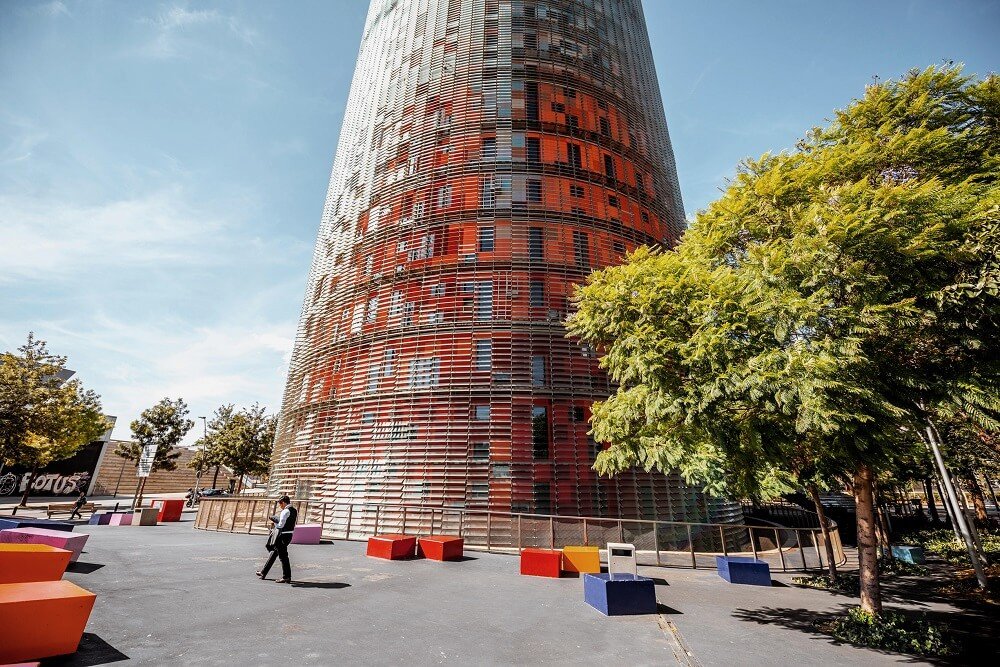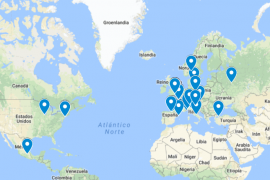The Torre Glòries building—formerly known as the Torre Agbar—will finally not be the headquarters of the European Medicines Agency, but it will be a strategic centre for data monitoring and fake news detection for Facebook. It has recently been confirmed that Austrian multinational Competence Call Center (CCC) has rented—for now—eight floors in the building where they will establish a unit to work exclusively for Mark Zuckerberg’s multinational, employing some 500 personnel. That is the same number of employees as CCC has in Essen, Germany, where they also focus on the detection of harmful content on the social network. In any case, the Austrian firm’s managers do not rule out that they will need to grow in Barcelona with further space and employees.
Facebook, or rather CCC, is one of the latest to stake on Barcelona for their operations, but the list of multinational companies that have recently chosen to be present in the Catalan capital is extensive. Not even the complex political scenario seems to have slowed the moves focusing mainly on three strategic sectors for the city’s economy: high-tech, logistics and manufacturing.
THE HIGH-TECH SECTOR
Barcelona has been an outstanding entrepreneurial centre for the technology sector for several years now, as we have already reported earlier. This awakening has generated an ecosystem with companies, and talent especially, making the Catalan capital an ideal place to locate high-tech projects. CCC’s announcement has attracted the attention of all the media because it means Facebook has located, albeit indirectly, in Barcelona. But that has not been the only big news for the sector recently. Lidl of Germany has also announced that it will install a new centre of excellence for customer service and digital business management in the old BBVA building in Plaça Catalunya, employing 250 staff. Another high-tech multinational that has announced its location here is Argentine Satellogic, specialized in high resolution imaging technology for microsatellites. They will establish their headquarters for Europe in the Catalan capital’s 22@ District. The company divulged the reason for choosing Barcelona was above all because of the considerable concentration of specialized and multicultural talent available.
This cultural spread is precisely the factor in demand by the dozens of specialized customer service companies that have elected to set large operating centres in Barcelona. In fact, Austrian CCC falls into this category of highly specialized, value-added call centres. But there are other large firms such as Zurich, Nestlé, Cisco, Roche or Visa who have also located international customer care centres in the city. Barcelona provides access to workers from all over the world with higher education and a very competitive salary environment in relation to other major European capitals.
But if there is one category that has established a paramount role in the technological sector in Barcelona, that is the video game industry. Precisely last January, the British firm King, a renowned developer of games such as Candy Crush or Farm Heroes, announced that it would expand its operation in the city and move to 9,000 sq metre premises in the 22@ District. The firm has seen the necessary potential in Barcelona to establish its hub for southern Europe. It is not alone. Among those who have also landed in Barcelona with the intention of establishing their European centre of operations here is Singaporean firm IGG. This will be the Asian giant’s second mobile games development centre. While the company has already started recruiting staff, it is also looking closely at the local studios with a view to a possible acquisition. There is a lot to choose from, as video game development is one of the outstanding sectors in the entrepreneurial upsurge in Barcelona. Some of the projects that have emerged here have been the subject of desire for leading multinationals. Just take for example Social Point, founded in Barcelona in 2008 by two young entrepreneurs, and bought by American Take-Two (publishers of Grand Theft Auto) for €233 million. In addition, the Catalan capital has university programmes in the discipline, pioneers in Spain, at the Universitat Pompeu Fabra and Universitat Politècnica de Catalunya, as well as a specialized incubator: Simon Lee’s GameBCN. All this has also attracted American firm Scopely, who announced in September that it was considering investing in Barcelona as the location for its first base outside the US.
LOGISTICS
Another technology giant, the American online trading platform Amazon, is responsible for the fact that Barcelona has consolidated as a strategic point for logistics in southern Europe. The company headed by Jeff Bezos has announced several multimillion-dollar investments to make Catalonia one of its logistics centres in Europe. The latest step was announced last November, with the opening of a 30,000 sq metre warehouse in Martorelles. This was the company’s fifth investment in Catalonia. Of these, €200 million was for the establishment of a large logistics centre in El Prat del Llobregat, which will employ 1,500 workers. Amazon has also dedicated part of this programme to customer service activities, making it one of the largest international investors in Catalonia in recent years.
Barcelona’s strategic position, close to the French border by road and with very competitive connections through its port and airport, has made the city one of the most desirable locations for e-commerce firms. And sector giant Amazon’s stake on the region makes it a real draw for new investors.
Yet another multinational that has opted for Catalonia in its logistics strategy is France’s Decathlon. The company inaugurated a 40,000 sq meter warehouse in Sant Esteve Sesrovires under two years ago, adding to the sports equipment distributor’s operations in the ZAL- Area of Logistics Activities in El Prat del Llobregat. These facilities next to the Port of Barcelona are also the location announced at the end of last year by US courier FedEx of a new ground operations centre that will employ 280 personnel and which it is to “open” a door to Europe, as explained at the time by the multinational.
Last year also saw the inauguration of facilities by Carrefour in the Area of Logistics Activities in the Port of Barcelona. The French distribution company now has an 18,200 sq meter space dedicated to cold storage for products that require freezing or refrigeration.
MANUFACTURING
Although the high-tech and logistics sectors have taken the lead in recent years, manufacturing should not be ignored as another pole of attraction for new Investments.
Swiss multinational Nestlé has been one of the most active in recent years, announcing fairly constant investments at its Nescafé plant in Girona. Meanwhile, Enerkem and Suez have recently announced a massive investment of €250 million in the construction of a new plant in El Morell, Tarragona, pioneering waste transformation in Spain and aiming to employ about a thousand people. The area of Tarragona, where most of Spain’s chemical industry is concentrated, is one of the poles of attraction for new projects and also for investments consolidating the plants that already exist there. For example, Bayer subsidiary Covestro announced the injection of €200 million a few months ago to expand its plant in Tarragona.
The automotive industry is another sector that is generating further interest. While the Volkswagen Group has made constant investments at the Seat plant in Martorell, the auto sector is keeping its fingers crossed, hoping to capture new manufacturing projects either from a Chinese manufacturer, or from US carmaker Tesla, which is seeking a site in Europe to build its second Gigafactory. The additions to the list of new arrivals does not seem to be slowing.

















